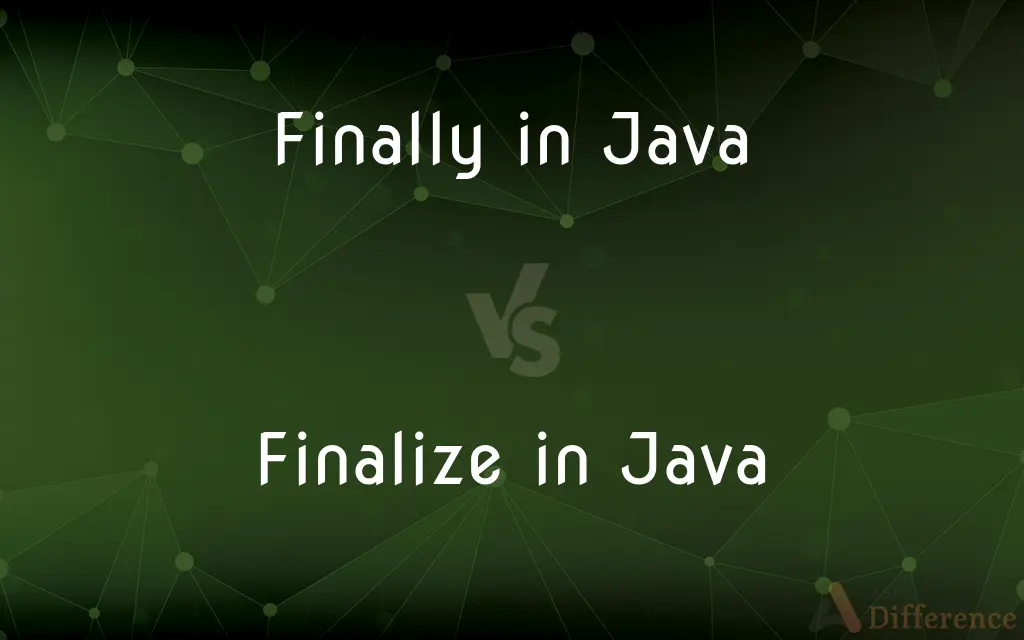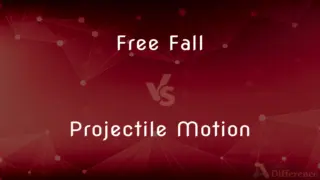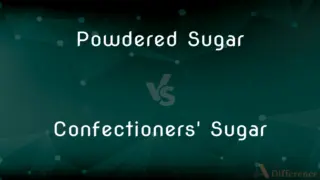Finally in Java vs. Finalize in Java — What's the Difference?
By Tayyaba Rehman & Urooj Arif — Published on January 30, 2024
Finally is a block in try-catch structure ensuring code execution regardless of exceptions; finalize is a method for object cleanup before garbage collection.

Difference Between Finally in Java and Finalize in Java
Table of Contents
ADVERTISEMENT
Key Differences
In Java, the finally block is part of exception handling, always executed after try-catch blocks, ensuring certain code runs irrespective of exceptions. Conversely, finalize is a method in the Object class, invoked by the garbage collector on an object when it determines that there are no more references to the object.
The finally block is crucial for resource management, like closing file streams or database connections, regardless of whether an exception was thrown or not. Finalize, however, serves a different purpose, providing a chance to perform cleanup activities before an object is destroyed, like releasing system resources or non-memory resources.
Finally blocks provide a guarantee of execution, making them reliable for essential code sections that must run even if an error occurs. In contrast, the finalize method does not have such a guarantee; its invocation timing is unpredictable, relying on the garbage collection process.
Finally is explicitly defined within the user's code structure, forming an integral part of the code's flow. On the other hand, finalize is invoked implicitly by the Java runtime, and its usage is generally discouraged due to unpredictability and potential impact on performance.
Overall, finally is a control flow mechanism, while finalize is part of Java’s garbage collection and object lifecycle management system, each serving distinct roles within Java's environment.
ADVERTISEMENT
Comparison Chart
Purpose
Ensures code execution after try-catch blocks.
Invoked before object garbage collection.
Control Flow
Part of explicit code structure.
Implicitly called by the garbage collector.
Reliability
Guaranteed execution.
Execution timing unpredictable.
Use Case
Resource management, closing resources.
Cleanup before object destruction.
Recommended Usage
Commonly used and recommended.
Usage discouraged due to unpredictability.
Compare with Definitions
Finally in Java
Ensures resource release, like closing files or database connections.
Try { connection.connect(); } finally { connection.close(); }
Finalize in Java
Offers a chance to perform operations before an object is permanently removed.
Protected void finalize() { logObjectDeletion(); }
Finally in Java
Executes code after try-catch, even if a return statement is in the catch block.
Try { return true; } catch (Exception e) { return false; } finally { cleanup(); }
Finalize in Java
Not guaranteed to be called, with unpredictable execution timing.
Protected void finalize() { releaseExternalResources(); }
Finally in Java
Ensures a section of code is always run, maintaining the program's integrity.
Try { updateUser(); } finally { unlockUserAccount(); }
Finalize in Java
Generally discouraged due to its unreliability and impact on performance.
Protected void finalize() { clearTemporaryData(); }
Finally in Java
Used for cleanup activities unrelated to exceptions.
Try { process(); } finally { resetSettings(); }
Finalize in Java
Method called by garbage collector to clean up an object before destruction.
Protected void finalize() { freeResources(); }
Finally in Java
A block that executes after try-catch, regardless of exception occurrence.
Try { file.open(); } catch (IOException e) { e.printStackTrace(); } finally { file.close(); }
Finalize in Java
Used for cleanup, especially non-memory resources like sockets or file handles.
Protected void finalize() { closeNetworkConnection(); }
Common Curiosities
When is finalize() called in Java?
It's called by the garbage collector before an object is destroyed.
What is a finally block in Java?
It's a block that follows try-catch, ensuring code execution regardless of whether an exception occurs.
Why is the usage of finalize() discouraged?
Due to its unpredictability and potential negative impact on performance.
Is the finally block mandatory in a try-catch structure?
No, it's optional but recommended for certain cleanup actions.
Can finally block be used without a catch block?
Yes, it can follow a try block directly.
What type of operations are suitable for a finally block?
Resource release operations, like closing file streams or database connections.
Can an object be resurrected in finalize()?
Yes, but it's highly discouraged as it complicates garbage collection.
Is finally block executed if an exception is not caught?
Yes, it executes irrespective of whether an exception is caught.
How does finally help in exception handling?
It ensures that necessary cleanup code is executed, maintaining resource integrity.
What happens if finalize() throws an exception?
The exception is ignored, and the finalization of that object is halted.
Can finalize() be called explicitly?
Yes, but it's not standard practice and is generally discouraged.
Does finalize() guarantee resource cleanup?
No, its execution is not guaranteed and can be unpredictable.
Is it necessary to implement finalize() in every class?
No, it's optional and generally not recommended.
What are the alternatives to using finalize()?
Using try-with-resources or explicit cleanup methods are preferred alternatives.
Can finally block contain return statements?
Yes, but it can overshadow exceptions thrown from the try-catch blocks.
Share Your Discovery

Previous Comparison
Free Fall vs. Projectile Motion
Next Comparison
Powdered Sugar vs. Confectioners’ SugarAuthor Spotlight
Written by
Tayyaba RehmanTayyaba Rehman is a distinguished writer, currently serving as a primary contributor to askdifference.com. As a researcher in semantics and etymology, Tayyaba's passion for the complexity of languages and their distinctions has found a perfect home on the platform. Tayyaba delves into the intricacies of language, distinguishing between commonly confused words and phrases, thereby providing clarity for readers worldwide.
Co-written by
Urooj ArifUrooj is a skilled content writer at Ask Difference, known for her exceptional ability to simplify complex topics into engaging and informative content. With a passion for research and a flair for clear, concise writing, she consistently delivers articles that resonate with our diverse audience.
















































